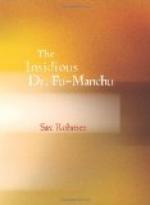“But how do you account for the fact that neither of the bodies have been recovered?”
“Ryman of the river police tells me that persons lost at that point are not always recovered—or not until a considerable time later.”
There was a faint sound from the room above. The news of that tragic happening out in the mist upon the Thames had prostrated poor Mrs. Weymouth.
“She hasn’t been told half the truth,” said her brother-in-law. “She doesn’t know about—the poisoned needle. What kind of fiend was this Dr. Fu-Manchu?” He burst out into a sudden blaze of furious resentment. “John never told me much, and you have let mighty little leak into the papers. What was he? Who was he?”
Half he addressed the words to Smith, half to Karamaneh.
“Dr. Fu-Manchu,” replied the former, “was the ultimate expression of Chinese cunning; a phenomenon such as occurs but once in many generations. He was a superman of incredible genius, who, had he willed, could have revolutionized science. There is a superstition in some parts of China according to which, under certain peculiar conditions (one of which is proximity to a deserted burial-ground) an evil spirit of incredible age may enter unto the body of a new-born infant. All my efforts thus far have not availed me to trace the genealogy of the man called Dr. Fu-Manchu. Even Karamaneh cannot help me in this. But I have sometimes thought that he was a member of a certain very old Kiangsu family—and that the peculiar conditions I have mentioned prevailed at his birth!”
Smith, observing our looks of amazement, laughed shortly, and quite mirthlessly.
“Poor old Weymouth!” he jerked. “I suppose my labors are finished; but I am far from triumphant. Is there any improvement in Mrs. Weymouth’s condition?”
“Very little,” was the reply; “she has lain in a semi-conscious state since the news came. No one had any idea she would take it so. At one time we were afraid her brain was going. She seemed to have delusions.”
Smith spun round upon Weymouth.
“Of what nature?” he asked rapidly.
The other pulled nervously at his mustache.
“My wife has been staying with her,” he explained, “since—it happened; and for the last three nights poor John’s widow has cried out at the same time—half-past two—that someone was knocking on the door.”
“What door?”
“That door yonder—the street door.”
All our eyes turned in the direction indicated.
“John often came home at half-past two from the Yard,” continued Weymouth; “so we naturally thought poor Mary was wandering in her mind. But last night—and it’s not to be wondered at—my wife couldn’t sleep, and she was wide awake at half-past two.”
“Well?”
Nayland Smith was standing before him, alert, bright-eyed.
“She heard it, too!”
The sun was streaming into the cozy little sitting-room; but I will confess that Weymouth’s words chilled me uncannily. Karamaneh laid her hand upon mine, in a quaint, childish fashion peculiarly her own. Her hand was cold, but its touch thrilled me. For Karamaneh was not a child, but a rarely beautiful girl— a pearl of the East such as many a monarch has fought for.




